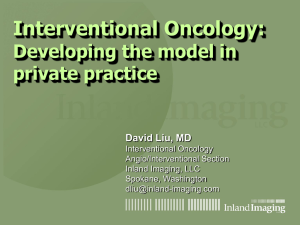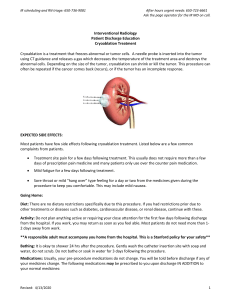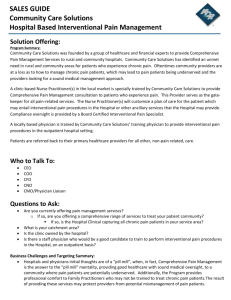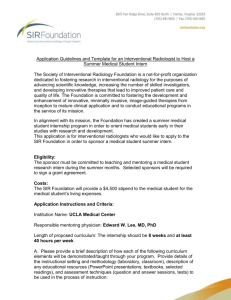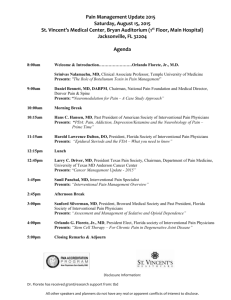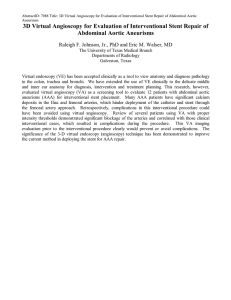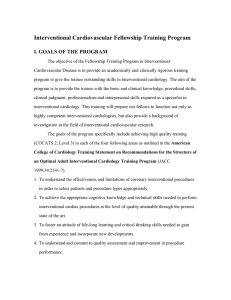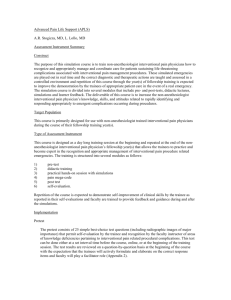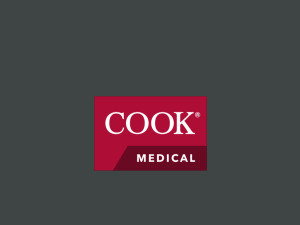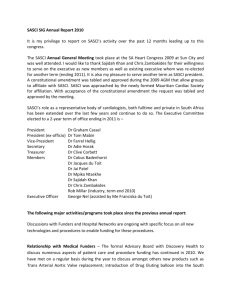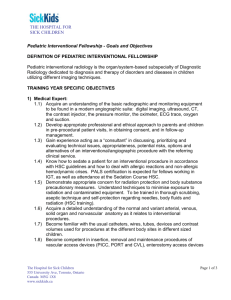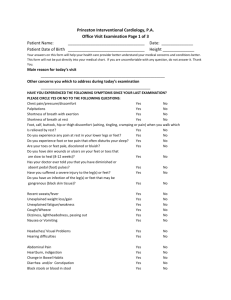SIR Foundation Summer Medical Student Internship Program 2015
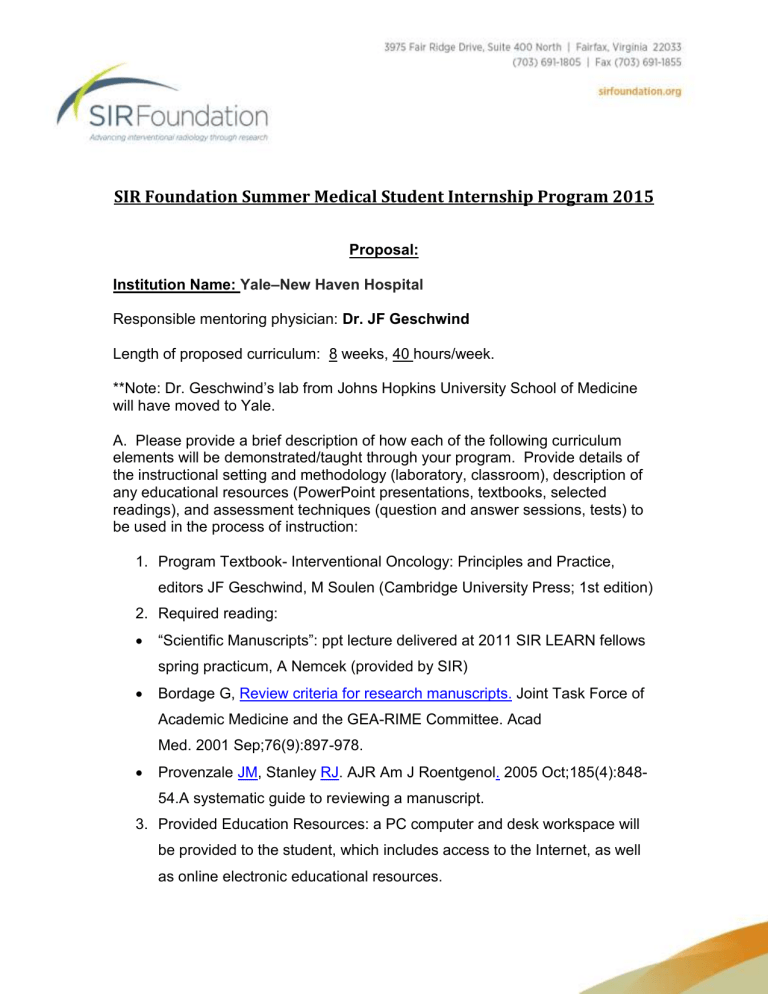
SIR Foundation Summer Medical Student Internship Program 2015
Proposal:
Institution Name: Yale
–New Haven Hospital
Responsible mentoring physician: Dr.
JF Geschwind
Length of proposed curriculum: 8 weeks, 40 hours/week.
**Note: Dr. Geschwind’s lab from Johns Hopkins University School of Medicine will have moved to Yale.
A. Please provide a brief description of how each of the following curriculum elements will be demonstrated/taught through your program. Provide details of the instructional setting and methodology (laboratory, classroom), description of any educational resources (PowerPoint presentations, textbooks, selected readings), and assessment techniques (question and answer sessions, tests) to be used in the process of instruction:
1. Program Textbook- Interventional Oncology: Principles and Practice, editors JF Geschwind, M Soulen (Cambridge University Press; 1st edition)
2. Required reading:
“Scientific Manuscripts”: ppt lecture delivered at 2011 SIR LEARN fellows spring practicum, A Nemcek (provided by SIR)
Bordage G, Review criteria for research manuscripts.
Joint Task Force of
Academic Medicine and the GEA-RIME Committee. Acad
Med. 2001 Sep;76(9):897-978.
Provenzale JM , Stanley RJ . AJR Am J Roentgenol .
2005 Oct;185(4):848-
54.A systematic guide to reviewing a manuscript.
3. Provided Education Resources: a PC computer and desk workspace will be provided to the student, which includes access to the Internet, as well as online electronic educational resources.
A) Mandatory elements:
1.
Concept development
–
The student will initially formulate an understanding of the clinical practice and procedural scope of a Vascular and Interventional Radiologist. This will serve as the initial 10% of the duration of the internship. The student will attend the IR
Morning conference. The Morning business rounds will expose the student to the procedures and clinical spectrum that an interventional radiologist faces.
Thereafter, the student will be assigned a supervising attending for each of the 5 days, where the student will immerse themselves to the VIR procedure room and function as a second assistant to each procedure. This will allow the student first hand exposure to potential clinical research questions. This “hands on” clinical instruction and research question hypothesis development will occur in the interventional fluoroscopy suites.
2.
Experimental design and statistics, including proof of concept, steps in validation of new technique:
3.
Techniques in the basic science lab
The student will be exposed to interventional oncology in a laboratory. Research is dedicated to basic and translational research studies in cancer with a strong emphasis on experimental therapeutics.
4.
Data collection, statistics, and meaningful analysis of data
The student will be directly supervised on a daily basis by the post-doctorate fellows and junior faculty members who are involved in the conduct of clinical trials. The student will observe the role played by the research coordinator as well as the regulatory coordinator and their importance in collecting data for
clinical research. Pertinent introductory clinical statistical analysis will be taught by the faculty. Usage of statistical software such as STATA will be provided.
5.
Constructing a well-written scientific paper
The award student will have direct instruction into the hallmarks of a well balanced scientific manuscript by Dr Geschwind (currently consultant to the editor, Radiology journal). This will focus on a well thought out focused scientific question, coupled with a succinct introduction to the topic; a Materials & Method section that reflects the scientific work and Results section that details all pertinent findings stemming from the work. The Discussion section will tie the relevance of the study question to that already in the literature and ultimately answer the original scientific question. The student’s own project will then be guided to follow this structure.
Suggested/optional elements:
1. Design and conduct of animal research and observation of animal research
The student will be introduced to animal pre-clinical research and spend 30% of the allocated time in the Interventional Oncology division. Instruction on the process of animal protocol development and implementation to test a research question will be provided by Dr Geschwind and/or the interventional radiology faculty.
The student will always be supervised by experienced post-doctoral fellows and/or junior faculty members.
B. Please provide a brief outline of available research topics, one of which the student will select for completion as part of the program. Projects should be of a scope appropriate for completion within the limited time frame provided.
The student will have access to a number of research projects both clinical and translational.
1. DEBIRI phase II study for patients with colorectal cancer liver metastases
2. DEB-TACE phase I-II study with small size microspheres for patients with
HCC
3. Lipiodol as an imaging biomarker of tumor response in liver cancer
(clinical study)
4. See, reach, treat and assess response to intraarterial therapies (NIH RO1)
5. Dose escalation of Y90 for patients with HCC: Correlation between
TcMAA scan and post-Y90 PET
6. Targeting tumor metabolism (in vitro and animal studies)
7. Understanding the role of GAPDH in cancer and developing tumor vaccines based on tumor glycolysis (DOD)
8. Reversal of hepatic fibrosis by targeting energy pathways (in vitro and animal studies)
The student will be asked to make an oral presentation at the Medical Student
Brunch at the SIR Annual Scientific Meeting in 2016.
